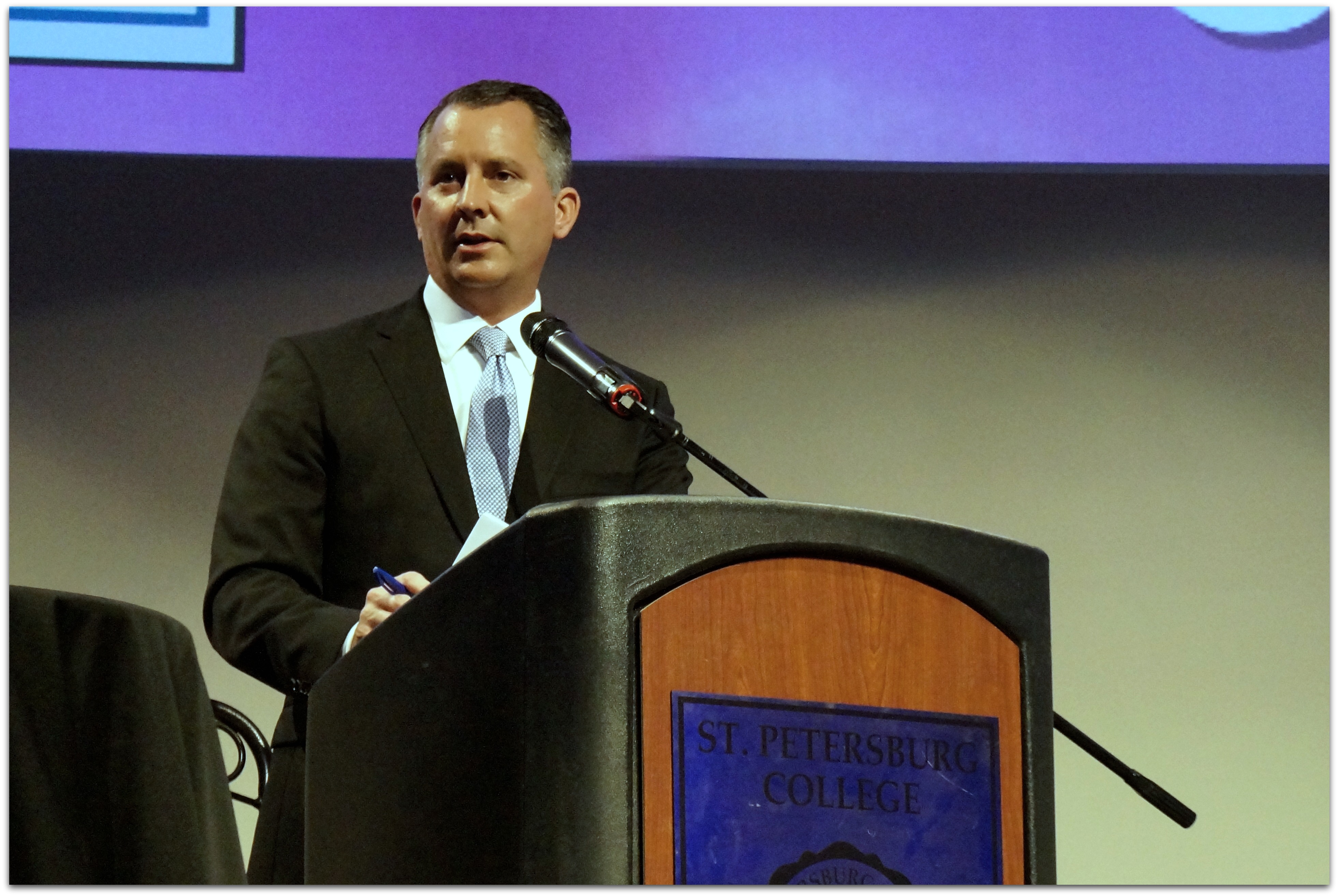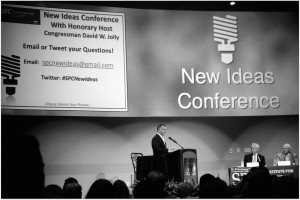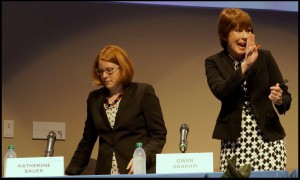
SPC’s 2nd Annual New Ideas Conference: Big Problems, Big Solutions
SPC Programs & Events April 12, 2016Article by Adam Zubek
Photography by Lilia Mickenzie
The SPC Institute for Strategic Policy Solutions presented the second annual New Ideas Conference on Friday, at the Seminole campus. Hosted by Congressman David Jolly, the event covered topics such as the looming terrorist threat, veteran’s care, and government reforms. Along with the Congressman, the event boasted a wide range of panelists, moderators, and speakers. From former Congressmen and women, to U.S Representatives, and radio hosts, to even a Medal of Honor recipient.
The goal of the event was to take national level issues, and scale them down to a local level, making them easier to grasp and find solutions to. The conversation remained entirely on the issues, as president of St. Petersburg College and introductory speaker Dr. Bill Law put it, “Leave the politics at the door”.
The first panel was titled “Veteran’s Welfare: Why Can’t We Get it Right?”. The panel focused on our nation fumbling to take care of its greatest heroes, particularly the problems in our V.A healthcare system. Problems such as long wait times, bureaucratic red tape, and sub-par care.
Every day, 22 veterans commit suicide, and those numbers are still on the rise. In an effort to combat this, the V.A is required to give every veteran discharged with mental health issues care within 6 months from their release from service. For many, even this proves to be too long of a wait, and the government is considering increasing this time to 18 months.
Gary Littren, a panelist who also served in the Vietnam War and received the Medal of Honor, says this is unacceptable and the V.A should be required to provide mental health care to our veterans within 6 weeks. Veteran suicide is a rolling crisis that has to be stopped. Another panelist, Johnny “Joey” Jones is a veteran of two wars in the Middle East. As an Explosive Ordinance Dispoal Bomb Tech, he was wounded by an explosion and lost both of his legs.
Jones say that to solve the Veteran Crisis, we have to “Look to the root of the problem, not treat the symptom”. He says our veterans are pumped full of medication and often struggle with addiction to painkillers. According to Jones, combat and combat related injuries aren’t what cause the staggering number of veteran suicides. Rather, a combination of broken families, economic hardships and substance abuse are what lead to many suicides. The first concluded with stating that the problem lies not with the care that our veterans receive, but with the process through which they go to get that care.
 The second panel was “Government Reform: Getting Congress to Do it’s Job.”. It’s no secret that Congress has been broken for a long time. With rampant partisan-ism, constant gridlock and the productivity nightmare known as the filibuster, it’s rare to ever see a bill get passed, let alone one that might actually make a difference, or affect change. These problems were discussed by former Congressmen Jim Davis, Dan Miller, and Tampa Bay Times editor Jim Nickens.
The second panel was “Government Reform: Getting Congress to Do it’s Job.”. It’s no secret that Congress has been broken for a long time. With rampant partisan-ism, constant gridlock and the productivity nightmare known as the filibuster, it’s rare to ever see a bill get passed, let alone one that might actually make a difference, or affect change. These problems were discussed by former Congressmen Jim Davis, Dan Miller, and Tampa Bay Times editor Jim Nickens.
Even if one party controls both the House of Representatives and the Senate, we still see progress grind to a halt due to the power of the filibuster. The filibuster is essentially talking a bill to death. All it takes is one Senator or Representative to not like a bill, and he or she can completely stall the Legislative branch of our government for hours, even days.
Another major issue with our government is our national debt, which at 19 trillion dollars, has spiraled out of control in recent years. Since the year 2000, it has increased by over 14 trillion. 65% of this 19 trillion is from entitlements and interest on the debt, yet our Congress cannot even pass a simple budget. So the question is: What can we do?
According to Davis and Miller, the answer lies in holding our Congress accountable. Under the Clinton administration, 500 billion dollars of the debt was paid off, proving that it is in fact possible to get the country back on track in terms of debt, but we need a functioning congress. Nickens put it, “The Founding Fathers may have intended gridlock as a way of preventing the majority from gaining too much power, but compromise is essential and rarely seen.”
The third and final panel at the event was “Emerging Threats of Terrorism”. It focused on both the cyber-attacks and the traditional terror attacks that have been increasing in frequency in recent years. The fear and paranoia that traditional terror attacks causes has been on the rise; with the refugee crisis and attacks tearing through Europe, terrorism is more rampant and damaging now than in any time in the past 15 years.
Besides these more visible attacks, almost as damaging are cyber-attacks, perpetrated by both state sponsored and lone wolf enemies of our nation. A cyber-attack on our nation can potentially cripple our infrastructure or economy. Panelist Sri Sridharan, the Chief Operating Officer of the Florida Center for Cybersecurity at USF said, “Every single person in this room has been hacked at some point”.
Cyber terror was shown to be one of the fastest growing threats to our security due to our often misplaced trust in open wifi networks. Sridharan stated that the best way to combat cyber-attacks is to practice “cyber-hygiene” and be careful about where you log into your accounts.
 From there, the conversation transitioned to the threat of ISIS, which has always been in the headlines as of recent months. Protecting American lives obviously was a hot topic, and the debate transferred to the battle between privacy and national security, using Apple’s refusal to help the government access the San Bernadino shooters iphone as an example.
From there, the conversation transitioned to the threat of ISIS, which has always been in the headlines as of recent months. Protecting American lives obviously was a hot topic, and the debate transferred to the battle between privacy and national security, using Apple’s refusal to help the government access the San Bernadino shooters iphone as an example.
On the topic of containing and defeating ISIS, the experts referenced recent coalition bombings of ISIS oil refineries and convoys, which has siphoned a large chunk of their finances away, allowing ground forces to start taking large amounts of their territory. U.S Representative Gwen Graham put it, “We can capitalize on their inevitable mistakes, and stop them without causing unnecessary loss of life.”
The New Ideas Conference ended with a farewell from Honorable Host David Jolly, who thanked the sponsors, the college, and all the panelists. The goal of the conference was to have as many minds as possible working out some of the biggest issues facing our country today, veterans’ affairs, government reform, and the threat of terrorism. He said he was honored to be able to host the Conference, and that he was looking forward to it becoming an annual tradition.






